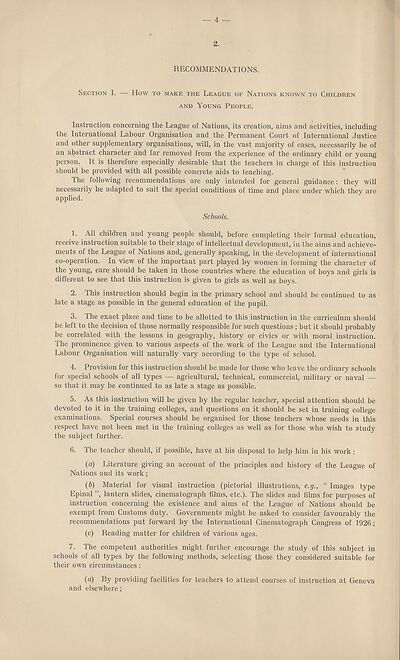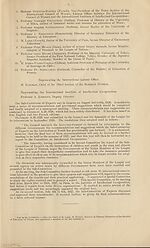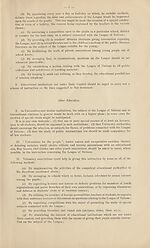Download files
Complete book:
Individual page:
Thumbnail gallery: Grid view | List view

— 4 —
2.
RECOMMENDATIONS.
Section I. — How to make the League of Nations known to Children
and Young People.
Instruction concerning the League of Nations, its creation, aims and activities, including
the International Labour Organisation and the Permanent Court of International Justice
and other supplementary organisations, will, in the vast majority of cases, necessarily be of
an abstract character and far removed from the experience of the ordinary child or young
person. It is therefore especially desirable that the teachers in charge of this instruction
should be provided with all possible concrete aids to teaching.
The following recommendations are only intended for general guidance: they will
necessarily be adapted to suit the special conditions of time and place under which they are
applied.
Schools.
1. All children and young people should, before completing their formal education,
receive instruction suitable to their stage of intellectual development, in the aims and achieve¬
ments of the League of Nations and, generally speaking, in the development of international
co-operation. In view of the important part played by women in forming the character of
the young, care should be taken in those countries where the education of boys and girls is
different to see that this instruction is given to girls as well as boys.
2. This instruction should begin in the primary school and should be continued to as
late a stage as possible in the general education of the pupil.
3. The exact place and time to be allotted to this instruction in the curriculum should
be left to the decision of those normally responsible for such questions ; but it should probably
be correlated with the lessons in geography, history or civics or with moral instruction.
The prominence given to various aspects of the work of the League and the International
Labour Organisation will naturally vary according to the type of school.
4. Provision for this instruction should be made for those who leave the ordinary schools
for special schools of all types — agricultural, technical, commercial, military or naval —
so that it may be continued to as late a stage as possible.
5. As this instruction will be given by the regular teacher, special attention should be
devoted to it in the training colleges, and questions on it should be set in training college
examinations. Special courses should be organised for those teachers whose needs in this
respect have not been met in the training colleges as well as for those who wish to study
the subject further.
6. The teacher should, if possible, have at his disposal to help him in his work :
(a) Literature giving an account of the principles and history of the League of
Nations and its work ;
(b) Material for visual instruction (pictorial illustrations, e.g., “ Images type
Epinal ”, lantern slides, cinematograph films, etc.). The slides and films for purposes of
instruction concerning the existence and aims of the League of Nations should be
exempt from Customs duty. Governments might be asked to consider favourably the
recommendations put forward by the International Cinematograph Congress of 1926;
(c) Reading matter for children of various ages.
7. The competent authorities might further encourage the study of this subject in
schools of all types by the following methods, selecting those they considered suitable for
their own circumstances:
(a) By providing facilities for teachers to attend courses of instruction at Geneva
and elsewhere;
2.
RECOMMENDATIONS.
Section I. — How to make the League of Nations known to Children
and Young People.
Instruction concerning the League of Nations, its creation, aims and activities, including
the International Labour Organisation and the Permanent Court of International Justice
and other supplementary organisations, will, in the vast majority of cases, necessarily be of
an abstract character and far removed from the experience of the ordinary child or young
person. It is therefore especially desirable that the teachers in charge of this instruction
should be provided with all possible concrete aids to teaching.
The following recommendations are only intended for general guidance: they will
necessarily be adapted to suit the special conditions of time and place under which they are
applied.
Schools.
1. All children and young people should, before completing their formal education,
receive instruction suitable to their stage of intellectual development, in the aims and achieve¬
ments of the League of Nations and, generally speaking, in the development of international
co-operation. In view of the important part played by women in forming the character of
the young, care should be taken in those countries where the education of boys and girls is
different to see that this instruction is given to girls as well as boys.
2. This instruction should begin in the primary school and should be continued to as
late a stage as possible in the general education of the pupil.
3. The exact place and time to be allotted to this instruction in the curriculum should
be left to the decision of those normally responsible for such questions ; but it should probably
be correlated with the lessons in geography, history or civics or with moral instruction.
The prominence given to various aspects of the work of the League and the International
Labour Organisation will naturally vary according to the type of school.
4. Provision for this instruction should be made for those who leave the ordinary schools
for special schools of all types — agricultural, technical, commercial, military or naval —
so that it may be continued to as late a stage as possible.
5. As this instruction will be given by the regular teacher, special attention should be
devoted to it in the training colleges, and questions on it should be set in training college
examinations. Special courses should be organised for those teachers whose needs in this
respect have not been met in the training colleges as well as for those who wish to study
the subject further.
6. The teacher should, if possible, have at his disposal to help him in his work :
(a) Literature giving an account of the principles and history of the League of
Nations and its work ;
(b) Material for visual instruction (pictorial illustrations, e.g., “ Images type
Epinal ”, lantern slides, cinematograph films, etc.). The slides and films for purposes of
instruction concerning the existence and aims of the League of Nations should be
exempt from Customs duty. Governments might be asked to consider favourably the
recommendations put forward by the International Cinematograph Congress of 1926;
(c) Reading matter for children of various ages.
7. The competent authorities might further encourage the study of this subject in
schools of all types by the following methods, selecting those they considered suitable for
their own circumstances:
(a) By providing facilities for teachers to attend courses of instruction at Geneva
and elsewhere;
Set display mode to:
![]() Universal Viewer |
Universal Viewer | ![]() Mirador |
Large image | Transcription
Mirador |
Large image | Transcription
Images and transcriptions on this page, including medium image downloads, may be used under the Creative Commons Attribution 4.0 International Licence unless otherwise stated. ![]()
| League of Nations > International > International committee on intellectual co-operation > (4) |
|---|
| Permanent URL | https://digital.nls.uk/195219307 |
|---|
| Shelfmark | LN.XII |
|---|
| Description | Over 1,200 documents from the non-political organs of the League of Nations that dealt with health, disarmament, economic and financial matters for the duration of the League (1919-1945). Also online are statistical bulletins, essential facts, and an overview of the League by the first Secretary General, Sir Eric Drummond. These items are part of the Official Publications collection at the National Library of Scotland. |
|---|---|
| Additional NLS resources: |
|

